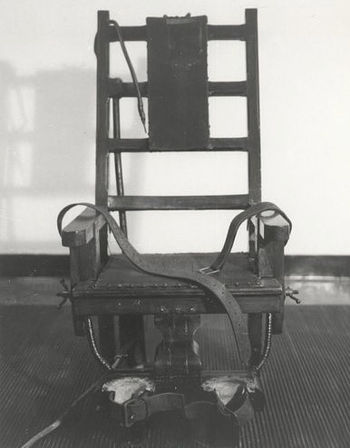
An early electric chair. Richeson was executed in an electric chair on May 21, 1912. (Photo credit: Wikipedia)
Edgar Smith was in solitary confinement awaiting his execution in the electric chair, sentenced to death for the first degree murder of a 15 year old girl by a jury that deliberated for less than three hours following his two week trial. In his jail cell he studied the law and read extensively. He became acquainted with William F. Buckley, the editor of National Review, and moderator of his own TV program: Firing Line.
By researching and writing his own appeals to the New Jersey Court of Appeals, Smith escaped the electric chair. By befriending Buckley, he was eventually set free when his conviction for first degree murder was set aside for retrial when the presiding judge ruled that evidence against him was gathered illegally. The State of New Jersey decided not to retry him, and he was released from prison after serving 14 years.
While in jail, Smith wrote several books, Brief Against Death, a refutation of the evidence used to convict him, Getting Out, and a novel, A Reasonable Doubt. The Kirkus Review of the novel praises it as “a balanced, painstaking overview of the law as it responds to both the greatnesses and weaknesses of the people it serves.” At the time he wrote the novel, Smith was still desperately trying to avoid execution. There can be very few reasons more compelling for a writer to create a novel, and lots of reasons to read it with a fair amount of attention to the possibility that there was more than just “a balanced overview of the law” at work in the body of the book.
Thanks for stopping by. I’d love to hear any comment you may have. You can share a comment below or post this entry on your favorite social media website.
Sign-up via the email or RSS option in the sidebar to receive MaineLarryCrane’s latest posts. You can also follow MaineLarryCrane via the various social media platforms listed on this website.
